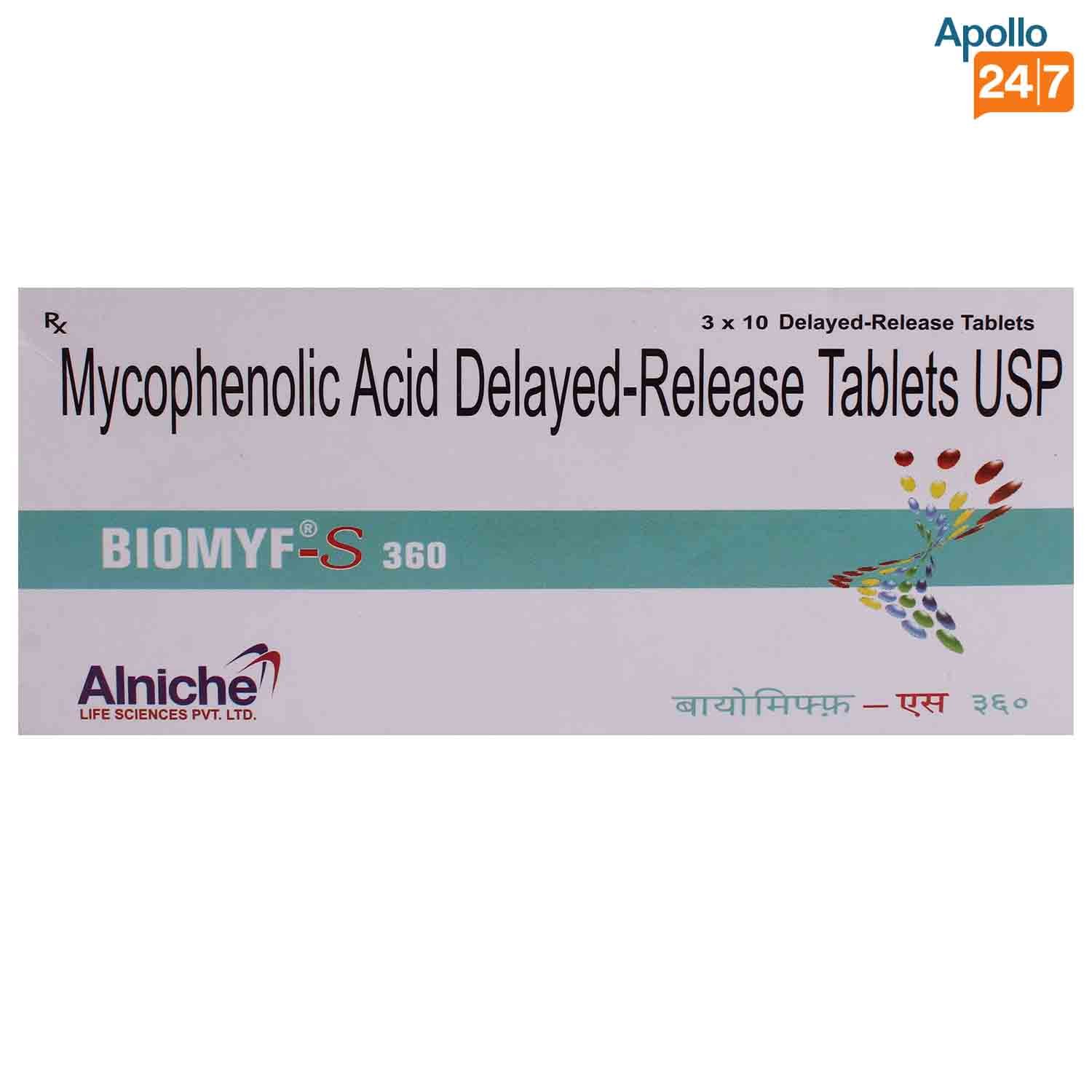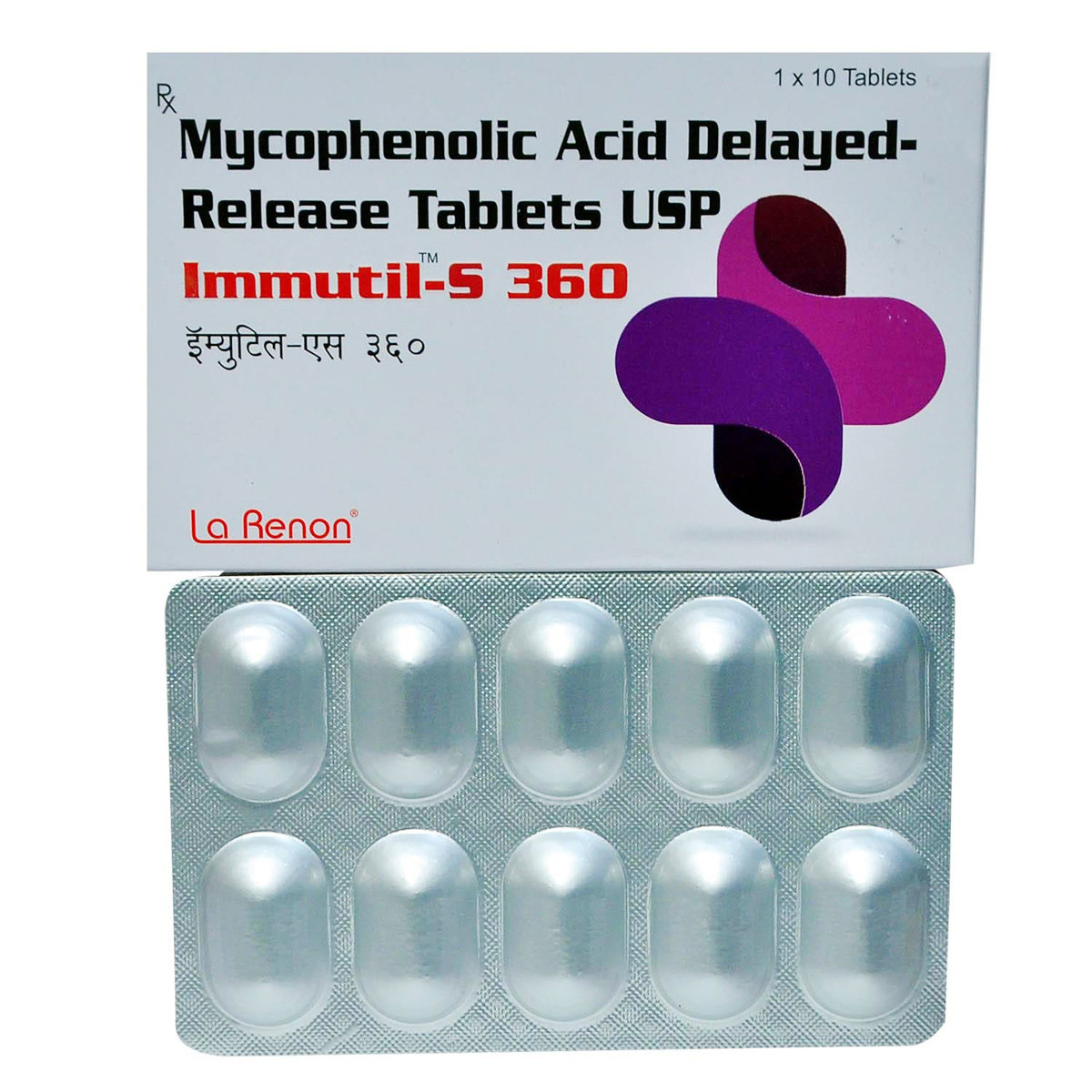Mycophenolate Sodium
About Mycophenolate Sodium
Mycophenolate Sodium belongs to a class of medications called ‘immunosuppressants’ used to prevent the body from rejecting a transplanted organ such as a kidney, heart or liver. Transplant rejection occurs when the recipient’s immune system identifies the transplanted organ as a ‘foreign object’ and attacks it. If it is not treated promptly, it may cause irreversible damage.
Mycophenolate Sodium contains ‘Mycophenolate sodium’ used in the treatment of organ transplant rejection along with another immunosuppressant and anti-inflammatory agent. It inhibits T and B lymphocytes (white blood cells that attack foreign cells) and suppresses antibodies' production (identify and kill foreign cells). These effects suppress the immune system so that the transplanted graft is not rejected.
You are advised to take Mycophenolate Sodium for as long as your doctor has prescribed it for you depending on your medical condition. In some cases, you may experience certain common side-effects, such as diarrhoea, cough, muscle pain, low blood pressure, fever and respiratory infections. Most of these side-effects do not require medical attention and will resolve gradually over time. However, you are advised to talk to your doctor if you experience these side-effects persistently.
To treat your condition effectually, continue taking Mycophenolate Sodium for as long as your doctor has prescribed. To avoid recurring symptoms, do not stop it midway. Do not take Mycophenolate Sodium if you are pregnant or planning for pregnancy. Mycophenolate Sodium should not be taken by breastfeeding mothers as it passes into breast milk. Mycophenolate Sodium should not be given to children as safety and efficacy have not been established. Mycophenolate Sodium may make you more susceptible to infections, consult your doctor if you develop fever, sore throat, breathlessness, jaundice, unexplained bleeding or bruising. Avoid excessive exposure to sunlight, wear protective clothing, and use protective sunscreen with a high protection factor while using Mycophenolate Sodium. Do not contact anyone who has shingles, chickenpox, or measles. Do not take Mycophenolate Sodium if you are not using effective contraception.
Uses of Mycophenolate Sodium
Medicinal Benefits
Mycophenolate Sodium contains ‘Mycophenolate sodium’ which belongs to the class of ‘immunosuppressants’. It is used to prevent organ transplant rejection. It reduces the activity of the immune system by inhibiting the action of white blood cells (responsible for immune reactions) in the body.
Directions for Use
Storage
Side Effects of Mycophenolate Sodium
- Dizziness
- Headache
- Cough
- Respiratory infections
- Weakness (asthenia)
- Muscle pain (myalgia)
- Shortness of breath (dyspnoea)
Drug Warnings
Do not take Mycophenolate Sodium if you are allergic to any immunosuppressant medicines or mycophenolate sodium. Let your doctor know before using Mycophenolate Sodium if you have liver or kidney problems, severe digestive issues, cancer, liver disease (such as hepatitis B, hepatitis C), current/past infections, rare genetic disorders (such as Lesch-Nyhan or Kelley-Seegmiller syndromes). Do not take Mycophenolate Sodium if you are pregnant or planning for pregnancy as Mycophenolate Sodium is a Pregnancy category risk D medicine which can cause serious congenital disabilities to the unborn baby. Mycophenolate Sodium should not be taken by breastfeeding mothers as it passes into breast milk. Pregnant women should use reliable forms of birth control while on treatment and for six weeks after stopping treatment with Mycophenolate Sodium. While taking Mycophenolate Sodium, do not contact anyone who has shingles, chickenpox, or measles. Mycophenolate Sodium causes dizziness and drowsiness, so drive with caution. Mycophenolate Sodium should not be given to children as safety and efficacy have not been established. Avoid consuming alcohol along with Mycophenolate Sodium as it could lead to increased dizziness. Your doctor may advise you to undergo regular blood tests, kidney and liver tests to monitor your condition. Avoid excessive exposure to sunlight, wear protective clothing, and use protective sunscreen with a high protection factor while using Mycophenolate Sodium.
Drug Interactions
Drug-Drug Interactions: Mycophenolate Sodium may have interaction with other immunosuppressant medicines (tacrolimus), medicines used to treat high blood cholesterol levels (cholestyramine), activated charcoal used to treat digestive problems, antacids containing magnesium and aluminium and medicines used to treat viral infections (aciclovir or ganciclovir).
Drug-Food Interactions: Avoid alcohol consumption while taking Mycophenolate Sodium as it may increase dizziness.
Drug-Disease Interactions: Mycophenolate Sodium may cause interactions with disease conditions such as cancer, liver disease (such as hepatitis B, hepatitis C), current/past infections, serious digestive problems, rare genetic disorders (such as Lesch-Nyhan or Kelley-Seegmiller syndromes).
Drug-Drug Interactions Checker List:
Safety Advice

Alcohol
unsafeYou are recommended to avoid alcohol consumption while taking Mycophenolate Sodium. It could lead to increased dizziness and drowsiness.

Pregnancy
unsafeMycophenolate Sodium may cause birth defects and miscarriage if taken during pregnancy. Follow contraception advice given by your doctor if you are a woman who could become pregnant. Also, undergo a pregnancy test before starting treatment with Mycophenolate Sodium.

Breast Feeding
unsafeIt is not recommended to take Mycophenolate Sodium while you are breastfeeding. Mycophenolate Sodium passes into breast milk.

Driving
cautionMycophenolate Sodium may cause dizziness, tiredness, do not drive or operate heavy machinery if you feel dizzy.

Liver
cautionTake Mycophenolate Sodium only after the doctor's prescription, especially if you have liver diseases/conditions as your doctor may adjust the dose as required.

Kidney
cautionPlease consult your doctor if you have kidney impairment before taking Mycophenolate Sodium as your doctor may adjust the dose as required.

Children
unsafeMycophenolate Sodium should not be used by children below 18 years of age, as the efficacy and safety have not been established.
Habit Forming
Diet & Lifestyle Advise
- Physical activity helps in strengthening muscles and relieves joint stiffness. Gentle activities like 20-30minutes of walking or swimming would be helpful.
- Performing yoga may also help in improving joint flexibility and pain management.
- Maintain a healthy weight by performing regular low-strain exercises and eating healthy food.
- Get adequate sleep as resting the muscles can help in reducing inflammation and swelling.
- Follow heat or cold therapy, apply a cold or hot compress on the joints for 15-20minutes regularly.
- De-stress yourself by meditating, reading books, taking a warm bubble bath or listen to soothing music.
- Acupuncture, massage and physical therapy may also be helpful.
- Eat food rich in antioxidants such as berries, spinach, kidney beans, dark chocolate, etc.
- Foods containing flavonoids help in reducing inflammation. These include soy, berries, broccoli, grapes, and green tea.
Special Advise
- Use sunscreen while taking Mycophenolate Sodium, as it can make your skin more sensitive to sunlight and may cause skin cancer.
- Do not donate blood while using this medication and for 6 weeks after stopping it. Do not donate sperm while using this medication and for 90 days after stopping it.
Patients Concern
Disease/Condition Glossary
Organ transplant rejection: When you get a new organ transplanted into your body, your body recognizes it as a foreign element and tries to attack and reject it because it is not originally part of your body. So, immunosuppressant drugs are given to such patients to suppress the immune system, stopping it from attacking the newly transplanted organs. Warnings signs of rejection are flu-like symptoms such as chills, headache, nausea, or vomiting, fever higher than 100o F, newly found pain at the region of the transplanted organ, weight gain and fatigue.
FAQs
Mycophenolate Sodium belongs to the group of medications called ‘immunosuppressants’. It works by weakening the immune system by inhibiting the production of cells or antibodies that attack foreign cells. This effect helps in stopping the immune system from targeting and rejecting the transplanted organ.
Mycophenolate Sodium causes leukopenia (decreased number of white blood cells) and hence may make you more susceptible to infections. Consult your doctor if you develop any signs of infections such as fever, sore throat, breathlessness, jaundice, unexplained bleeding or bruising.
Diarrhoea might be a side-effect of Mycophenolate Sodium. Drink lots of fluids and eat food rich in fibre if you experience diarrhoea. If you find blood in stools (tarry stools) or if you experience prolonged diarrhoea consult your doctor. Do not take anti-diarrheal medicine on your own.
Mycophenolate Sodium can suppress the immune system and can increase the risk of skin cancer. So, it would be best if you avoid prolonged exposure to sunlight. Also, wear protective clothing covering your head, neck, arms and legs, and use a sunscreen lotion with a high SPF (sun protection factor).
Mycophenolate Sodium can suppress the immune system. You should not donate blood while using Mycophenolate Sodium and at least 60 days after stopping treatment as it makes you more prone to infections. Besides, men should not donate sperm while using Mycophenolate Sodium for at least 90 days after stopping the treatment.
Some medicines might absorb mycophenolate sodium delayed or absorbed fast if taken concomitantly such as antacids containing aluminium or magnesium, colestipol, cholestyramine or calcium-free phosphate binders. Before taking Mycophenolate Sodium, speak with your doctor about your ongoing medication list. Your doctor will decide whether they should be taken along with Mycophenolate Sodium or not.
The live vaccine may not work while on treatment with Mycophenolate Sodium. Do not have immunizations/vaccinations without talking to your doctor first. Also, avoid contact with people who recently had immunizations /vaccinations.





